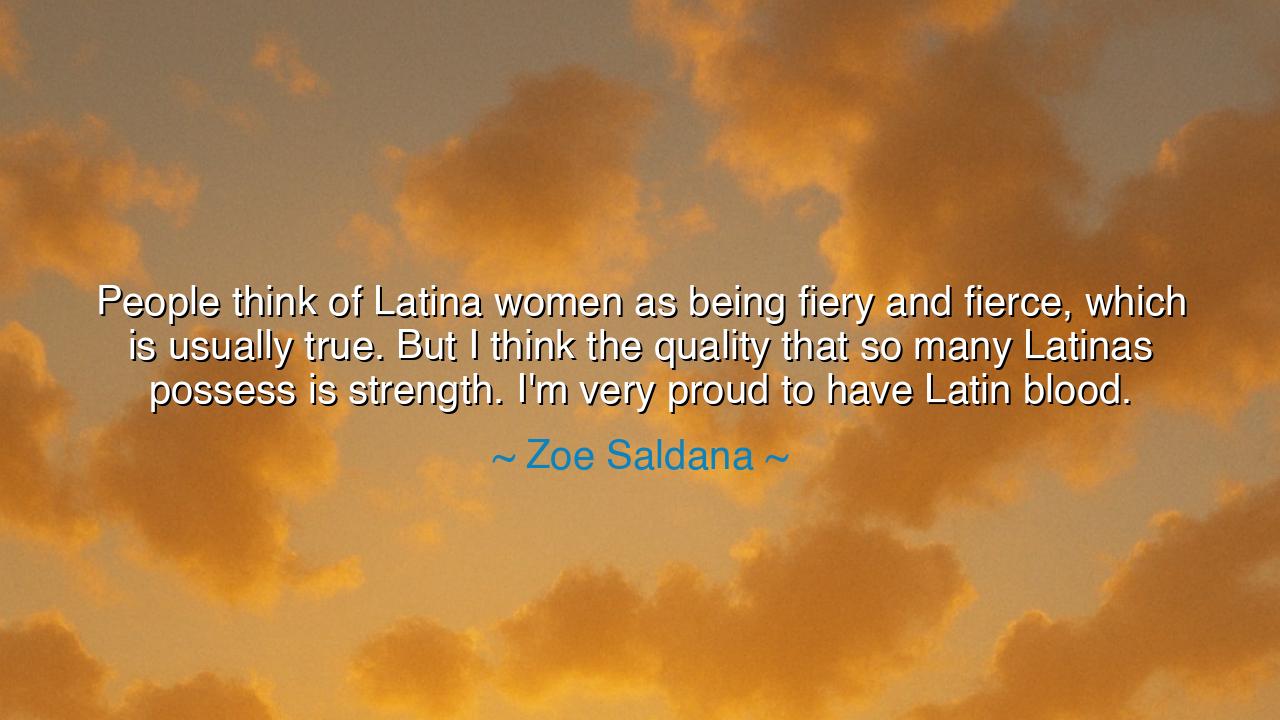
People think of Latina women as being fiery and fierce, which is
People think of Latina women as being fiery and fierce, which is usually true. But I think the quality that so many Latinas possess is strength. I'm very proud to have Latin blood.






Hear the voice of Zoe Saldana, daughter of Latin heritage and bearer of a proud flame, who spoke these words: “People think of Latina women as being fiery and fierce, which is usually true. But I think the quality that so many Latinas possess is strength. I’m very proud to have Latin blood.” Her words rise beyond mere description; they are a testimony, a tribute to the endurance of generations who carried not only passion, but the indomitable power of the human spirit.
When she speaks of being fiery and fierce, she acknowledges the image the world often sees: passion in voice, courage in action, and resilience in heart. Yet she peers deeper, beyond surface, and points to the hidden treasure: strength. For passion may flare like fire, but strength endures like stone. Strength is what allows families to survive migration, oppression, and hardship. Strength is the inheritance of women who raised children in adversity, who labored when the world dismissed them, who carried dignity when others sought to strip it away.
Consider the story of Dolores Huerta, co-founder of the United Farm Workers. She was a Latina woman who faced ridicule, threats, and violence, yet stood unwavering in her fight for the dignity of farm laborers. Many called her fierce, and rightly so. But what truly sustained her was strength—the strength to organize, to lead, to endure the endless struggle for justice. Her life illustrates Saldana’s words: Latina women are not defined solely by fire, but by the enduring strength that fuels it.
This strength is born from history itself. For centuries, Latin America has been a land of struggle and beauty, of hardship and triumph. Women carried culture in their songs, preserved memory in their kitchens, and taught resilience in their stories. Whether through revolutions, colonization, or the challenges of new lands, Latina women endured, and in enduring, they passed on to their daughters not only passion, but the quiet and immovable will to survive and thrive.
Saldana’s pride in having Latin blood is more than personal—it is ancestral. To be proud of one’s roots is to honor the sacrifices of those who came before. It is to say, “Their struggles are not forgotten. Their victories live in me.” This is why heritage is not merely history, but living strength, coursing like blood through each new generation. Pride, here, is not arrogance, but gratitude and reverence for the lineage that shaped one’s identity.
The lesson for us, O listener, is timeless: do not let the world define you by surface traits alone. If people call you fiery, or fierce, or passionate, accept it, but also remind them—and yourself—that beneath the flame is a deeper strength. Fire dazzles for a moment, but strength sustains for a lifetime. It is this strength that carries you through adversity, that builds families, that uplifts communities.
Practical actions are these: embrace your heritage, whatever it may be, and honor the strength it has given you. When hardship comes, remember those before you who endured greater trials, and let their memory fortify you. Do not be ashamed of passion, but root it in discipline and resilience, so that it may burn without consuming you. And above all, teach others that strength is not only physical, but also moral, emotional, and spiritual.
Thus let Zoe Saldana’s words be remembered: “The quality that so many Latinas possess is strength.” Carry this as a banner of identity and pride. For the truest strength is not loud, but enduring, not fleeting, but eternal. And when you draw upon it, you do not stand alone—you stand with the countless ancestors who walked before you, and you blaze a path for those yet to come.






AAdministratorAdministrator
Welcome, honored guests. Please leave a comment, we will respond soon